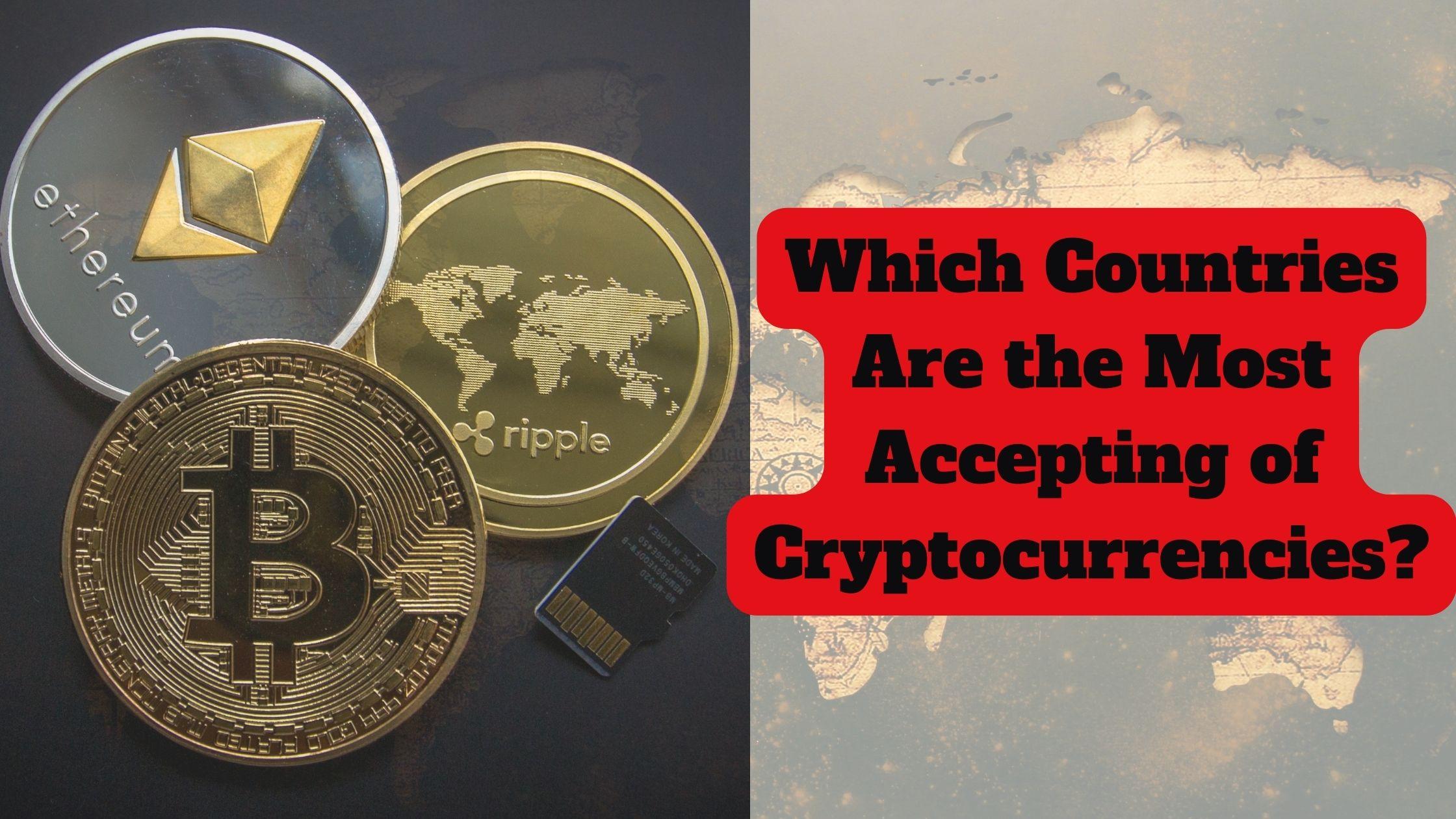Cryptocurrencies have taken the financial world by storm in recent years, revolutionizing the way we think about money and transactions. While they were initially met with scepticism and regulatory challenges, cryptocurrencies are now gaining acceptance in various parts of the world. As the popularity of digital currencies continues to soar, it’s crucial to understand which countries are at the forefront of embracing this transformative technology. In this article, we’ll explore the top countries that have shown the most acceptance and enthusiasm for cryptocurrencies and blockchain technology.

1. The Crypto-Friendly Nations
Innovators Leading the Way
Some nations have not only embraced cryptocurrencies but have also positioned themselves as innovators in the blockchain space. Switzerland, often referred to as “Crypto Valley,” is a prime example. The country’s favorable regulatory environment, along with its pro-crypto stance, has attracted numerous blockchain startups and businesses. Switzerland is home to the Ethereum Foundation and hosts various blockchain conferences and events, making it a hub for cryptocurrency enthusiasts and entrepreneurs from around the world.
Malta: The Blockchain Island
Malta is another standout example of a nation wholeheartedly embracing cryptocurrencies. In recent years, Malta has introduced a comprehensive regulatory framework for blockchain and cryptocurrency businesses. This proactive approach has led to numerous cryptocurrency exchanges and blockchain companies setting up shop on the island, earning it the moniker “Blockchain Island.” The government’s commitment to fostering innovation in the sector has made Malta a top destination for blockchain entrepreneurs and investors.
2. Cryptocurrency Regulations and Compliance
The United States: A Complex Landscape
The United States has a complex relationship with cryptocurrencies. While the country has shown significant interest in blockchain technology and digital assets, its regulatory approach varies from state to state. Some states, like Wyoming, have introduced crypto-friendly laws, while others remain more cautious. The U.S. Securities and Exchange Commission (SEC) plays a pivotal role in shaping cryptocurrency regulations, with ongoing efforts to provide clarity to the industry. This evolving regulatory landscape has both encouraged and challenged cryptocurrency adoption within the country.
Japan: Legal Recognition and Consumer Protection
Japan is among the few countries that have granted legal recognition to cryptocurrencies as a means of payment. The country has established a licensing system for cryptocurrency exchanges and enacted strict regulations to protect consumers. This proactive regulatory stance has led to a thriving cryptocurrency market in Japan, with widespread acceptance among businesses and consumers alike. Japanese yen is one of the most widely traded fiat currencies for cryptocurrencies, further demonstrating the country’s acceptance of digital assets.

3. Cryptocurrency Adoption in Everyday Life
Estonia: E-Governance Pioneer
Estonia has long been a trailblazer in digital governance and is no exception when it comes to cryptocurrency adoption. The country has implemented blockchain technology for various aspects of government operations, including e-residency programs and digital identity systems. Estonians can even use cryptocurrency to pay for public services. This forward-thinking approach has positioned Estonia as a leader in blockchain integration at the government level, making it one of the most accepting countries for cryptocurrencies in everyday life.
Venezuela: Cryptocurrency Amid Economic Challenges
Venezuela’s case is unique in that the country has turned to cryptocurrencies out of economic necessity. Hyperinflation and a devalued national currency have pushed many Venezuelans to seek refuge in cryptocurrencies like Bitcoin as a store of value. The government has also introduced its own cryptocurrency, the Petro, as a means to stabilize the economy. While Venezuela’s situation is a stark reminder of the potential of cryptocurrencies in times of financial crisis, it also raises questions about the ethical and political implications of state-controlled digital currencies.
4. Challenges and Concerns
Security and Fraud Concerns
One of the primary concerns surrounding cryptocurrency adoption is security and fraud. The decentralized nature of cryptocurrencies can make them attractive to cybercriminals. Some countries have taken significant steps to combat fraud and enhance security in the crypto space. For example, South Korea has implemented strict KYC (Know Your Customer) and AML (Anti-Money Laundering) regulations for cryptocurrency exchanges to prevent illegal activities.
Taxation and Reporting
Taxation is another complex issue when it comes to cryptocurrencies. Some countries, like Germany, have clear guidelines on how cryptocurrencies should be taxed, while others are still working to establish a comprehensive tax framework. Individuals and businesses involved in cryptocurrency transactions must navigate varying tax regulations and reporting requirements, which can be a deterrent to wider adoption.

6. The Future of Cryptocurrency Acceptance

Global Trends and International Collaboration
Cryptocurrency acceptance is not just a national matter; it’s a global phenomenon. As cryptocurrencies transcend borders, international collaboration and regulatory harmonization are becoming increasingly important. Organizations like the Financial Action Task Force (FATF) are working on developing international standards for cryptocurrency regulation to address issues such as money laundering and terrorist financing. A coordinated effort among nations can provide a more conducive environment for cryptocurrency businesses to thrive while maintaining security and compliance.
Central Bank Digital Currencies (CBDCs)
Central banks around the world are exploring the potential issuance of central bank digital currencies (CBDCs). These government-backed digital currencies could coexist with cryptocurrencies and traditional fiat currencies. While CBDCs represent a different approach to digital currencies, they indicate a recognition of the growing importance of digital assets in the global economy. Countries like China have already started piloting CBDCs, with potential implications for the international monetary system.
7. Investment and Entrepreneurship
Startups and Innovation Hubs
Countries that embrace cryptocurrencies tend to attract a wave of investment and entrepreneurial activity. The presence of cryptocurrency-friendly regulations and a supportive ecosystem can stimulate the growth of blockchain startups. For instance, Singapore has positioned itself as a leading hub for cryptocurrency innovation in Asia, with a thriving community of blockchain companies and investors. Such hubs can be a catalyst for technological advancements and economic growth.
.
Institutional Adoption
In recent years, institutional investors have begun to enter the cryptocurrency space, further legitimizing digital assets. Prominent financial institutions, including investment funds and traditional banks, are allocating resources to explore cryptocurrency investment opportunities. Countries that offer a clear regulatory framework and investor protection measures are more likely to benefit from institutional adoption, potentially leading to increased cryptocurrency acceptance.
8. The Role of Education and Awareness

Public Understanding and Education
Promoting cryptocurrency acceptance also involves raising public awareness and fostering a better understanding of digital assets. Governments, educational institutions, and industry organizations can play a significant role in educating the public about the benefits and risks associated with cryptocurrencies. Providing accessible resources and guidance on safe practices can empower individuals to participate in the cryptocurrency ecosystem responsibly.
Consumer Protection
Effective consumer protection measures are essential to building trust in the cryptocurrency space. Countries that prioritize consumer education and enforce regulations to prevent fraud and scams contribute to a safer environment for cryptocurrency users. Initiatives such as creating dedicated cryptocurrency ombudsman offices or helplines can offer recourse for individuals facing issues in their cryptocurrency transactions.
9. The Evolving Landscape
Cryptocurrency acceptance is a dynamic field that continues to evolve. While some countries are currently leading the way, the landscape can change rapidly as governments adapt to the evolving technology and market dynamics. It’s crucial for nations to remain agile and open to adjusting their regulatory approaches to strike a balance between innovation and security.
Navigating the World With Crypto
The acceptance of cryptocurrencies is a multifaceted phenomenon that encompasses regulatory, economic, and cultural factors. While some countries have taken bold steps to embrace digital assets and blockchain technology, others are proceeding with caution. The future of cryptocurrency acceptance will likely be shaped by international collaboration, the development of central bank digital currencies, and the degree of support for startups and innovation.
As the world continues to grapple with the challenges and opportunities presented by cryptocurrencies, one thing remains clear: digital assets are here to stay. How each country chooses to navigate this new financial landscape will determine its position in the global economy and its ability to harness the benefits of this transformative technology. The journey towards widespread cryptocurrency acceptance is a complex and ongoing one, and the world will be watching to see which nations emerge as leaders in this exciting new era of finance.
This article was written by Eliza Cochrane, content writer for Mulah

